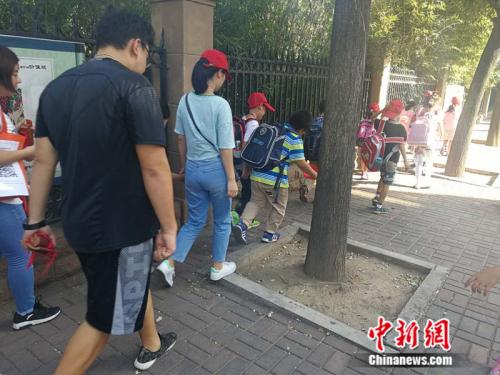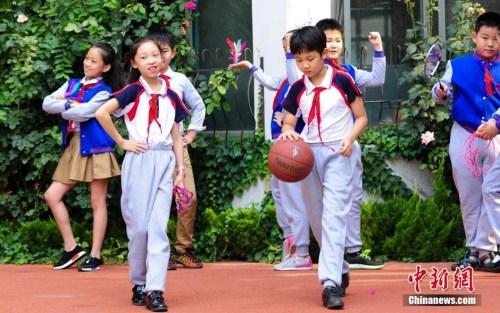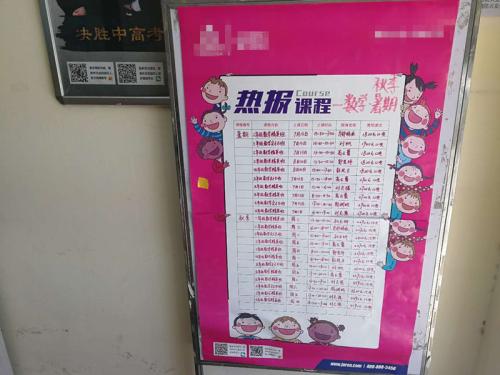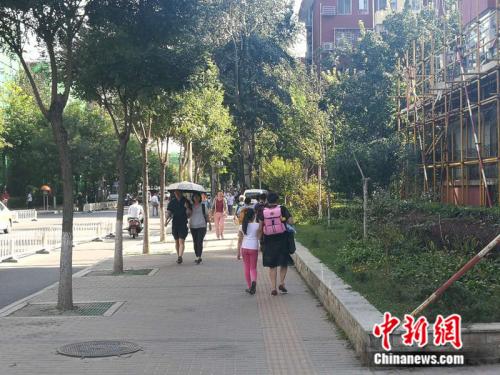Parents are embarrassed early after school in primary schools: how to solve the "3: 30 problem"?
BEIJING, Beijing, September 14 (Reporter Zhang Ni) In recent years, with the promotion of burden reduction in primary and secondary schools, the school hours of primary schools in many areas have advanced to around 3: 30. However, children leave school early and parents leave work late, which makes many parents feel embarrassed — — It is unrealistic to ask for leave, and there are many concerns about the custodian. How should we solve the "3: 30 problem"?

Parents are worried about picking up their baby after school at 3: 30.
"When I get to school, I have a headache. My wife and I both go to work. The off-duty time is five or six o’clock, but children usually leave school at three or four o’clock, and picking up children has become a problem." Mr. Wang, a citizen who lives in Haidian District, Beijing, said that every time he started school, he began to worry about picking up the baby.
Mr. Wang’s son is in the fourth grade. Before that, Mr. Wang’s mother helped to pick him up, but in the past two years, because his mother was in poor health, he had to pick him up with his wife.
"Now the school has after-school activities three days a week, and the school time is relatively late. I will rotate with my wife for the remaining two days. Whoever is not busy will pick up the children in advance." Mr. Wang said that because the school is close to home, he and his wife planned to let the children go to school by themselves after they entered the fifth and sixth grades, but he was still a little worried.
Mr. Wang’s experience is also a portrayal of the real life of many young parents. In order to solve the problem, many elderly people took the initiative to take over the heavy responsibility of receiving the baby. Ms. Shen, 66, is one of them.
Ms. Shen lives in Haidian District. Her grandson is in the first grade of primary school this year. Because both her son and daughter-in-law have to work, the job of picking up and dropping off the children is given to her.
"I have to go back and forth between home and school several times a day, and I have to walk on the road for nearly an hour a day." Ms. Shen said that because she is in good health, she can accept it, but I am afraid that the elderly who are in poor health will be a little overwhelmed.
"Last year, my son asked for a second child, and I hired a nanny to take the second child at home. I can still be busy when I send the boss. When the second child starts to go to kindergarten, I have to pick up two. Without a nanny, I will definitely be too busy." Ms. Shen said.

Market demand gives birth to trusteeship fever
The problem of parents picking up their children has also left business opportunities for off-campus hosting institutions, and the fees of such institutions are expensive.
A few days ago, the reporter consulted a primary school care institution in Zhongguancun, Beijing, and learned that the cost of hosting a primary school student in this institution is 1,480 yuan per month, while the student’s meal fee is calculated separately, which is the charging standard for each meal in 20 yuan. In this way, if a primary school student has dinner once a day in a custody institution, the monthly expenses add up to nearly 2,000 yuan, which is not a small expense for many parents.
Even so, because of the large demand, the number of custody places of custody institutions is also very popular.
"The number of students we can accept is limited, so we usually start to register in mid-August, and there will be very few places left when the school starts." A staff member of the agency told reporters.
For such a custodian, parents also have their own concerns.
"One depends on whether the price charge is acceptable. In addition, if we really want to send our children to such a custody institution, we must also check the qualifications, safety facilities, the level of teachers, the quality of food, etc. We are all concerned." Mr. Wang expressed his concern.

The teacher vomited: it is very tiring to organize after-school activities.
In the first half of this year, the Ministry of Education issued the Guiding Opinions on Doing a Good Job in After-school Services for Primary and Secondary School Students. Among them, it is clear that we should give full play to the role of the main channel of after-school service in primary and secondary schools. The majority of primary and secondary schools should make full use of their advantages in management, personnel, venues and resources, and take the initiative to assume the responsibility of students’ after-school service.
The reporter learned that after-school expansion activities have been carried out in primary schools in many areas, including Beijing. However, in the process of school implementation, there are also many practical problems.
Lin Lin (pseudonym), who works as an English teacher in a primary school in Chaoyang District, Beijing, said in an interview that her primary school will hold community activities three days a week, but because of the limited resources of teachers in the school, some interest activities need to be outsourced to hire teachers.
"Schools should also increase their funding, not only paying the class fees of external teachers, but also paying some remuneration to the class teachers." Lin Lin said.
"Community activities usually disrupt classes, and it is difficult for teachers to manage classroom discipline. Therefore, each class should be equipped with a class supervisor. Once the class is over, children like to have classes in disorder, so the class supervisor must always be nervous to prevent danger." Lin Lin told reporters that he will arrive at school at seven o’clock every day, and his usual workload is already very heavy. Coupled with the arrangement of extracurricular activities, he is very tired at the end of the day.

After school at 3: 30, did the students reduce their burden?
On the one hand, the school leaves school early, on the other hand, the students’ schoolwork burden has not really been alleviated. Many primary school students hurried to the off-campus cram school after leaving the school gate. Xiaoding, who is in the sixth grade this year, is one of them.
"I don’t have cram schools now except Monday and Sunday, and I have extracurricular classes the rest of the time." Xiaoding told reporters.
Xiaoding’s school is a key primary school in Beijing. It will finish school before three o’clock every Tuesday and Friday, but he still has cram schools to attend. Usually, Xiaoding goes to cram school by bike every time he comes home from school to pack his things, and many students in the class have similar situations.
"We are under great pressure as parents. Some of our children’s classmates were recruited by key middle schools in the fourth and fifth grades. If they can’t be recruited, they can only participate in computer allocation, which is quite anxious." Mr. Zhu, who lives in Haidian District, expressed emotion in an interview.
Mr. Zhu also has a daughter who has just entered the sixth grade. Because he is worried that his child will be sent to a bad middle school, he began to take his child to take some key middle school exams very early.
"In fact, children have very little homework in school and can finish it soon, but we also reported three or four extracurricular classes to our children, so it is not easy." Mr. Zhu said that as long as the child’s junior high school is not solved one day, his heart will always be hanging.

How to solve the problem?
On the one hand, the state advocates reducing the burden and letting students leave school early. On the other hand, schools and parents are faced with various implementation problems. How to solve the contradictions?
In fact, in recent years, many local governments have introduced relevant policies to solve the problem.
For example, Beijing, Chengdu and other places have established a financial guarantee mechanism. Public primary schools in Shanghai generally provide free after-school care services to students who have difficulties in family care. Qingdao and other places "take the school family Committee as the leading factor and the school participates in cooperation" and rely on the school’s premises and equipment to carry out after-school service.
"Solve ‘ 3: 30 problem ’ It is still necessary to let the school play an active role and carry out more extracurricular activities, but this requires a policy tilt, focusing on giving teachers subsidies and improving teachers’ enthusiasm. " Gu Mingyuan, honorary president of China Education Association, stressed in an interview with Zhongxin. com.
Gu Mingyuan analyzed that while the government gives financial support to schools, it should also give them autonomy in running schools. "Education should also be shared, so that schools can fully tap and utilize all social resources, even including inviting parents with special skills to participate in after-school activities. Children should not be pushed to training institutions because of school."
Chu Zhaohui, a researcher at the China Academy of Educational Sciences, believes that students should also be given some time for independent activities, rather than just "going to school — — Going home is a two-point and one-line life, and the part that is in contact with society is missing.
"In the process of children’s growth, it is not only the school that has an educational role, but also the society. Education should return to a normal state, so that children can participate in social activities independently and find their own interests." Chu Zhaohui said.
In addition, Chu Zhaohui emphasized that if the disguised junior high school entrance examination still exists, then the children are still tied to the examination and academic performance, so it is difficult to really reduce the burden. (End)